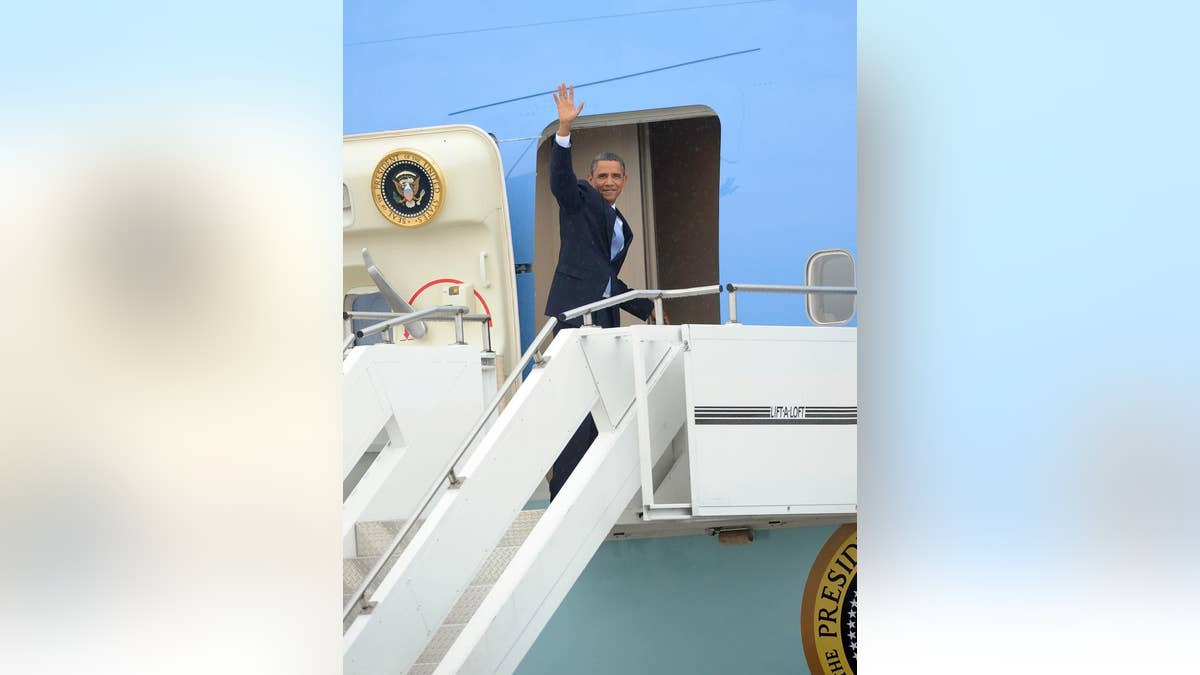
President Obama boards Air Force One/AP
Just days after the Democratic Party is expected to suffer some level of defeat in the midterm elections, President Obama will leave Washington and head overseas. The White House has scheduled one of the longest trips of the presidency so far, with a 10-day multi-country tour that commences just two days after votes have been cast.
The trip, which has been planned for quite some time, includes a stop in Japan at the end of the itinerary for the annual Asian Pacific Economic Cooperation (APEC) meeting which is scheduled for November 13 -14th.
But it's the departure date that some have said shows the president rushing off after the November 2nd elections.
One conservative critic called it the "Elvis has left the building" technique which enables the president to dodge inconvenient encounters. Ernest Istook, a former Republican Congressman from Oklahoma and a distinguished fellow at The Heritage Foundation calls the president's absence ill-timed saying, "aside from the elections, he's making himself unavailable to prepare for the major issues in the lame duck session of Congress that starts November 15th."
White House Press Secretary Robert Gibbs, who has insisted since the summer Democrats will retain both their House and Senate majorities, says international priorities don't just vanish during an election season. "This is an important election, but there's also important work to be done...in ensuring that we have the type of relationships around the world and the type of business relationships in the world that can buy and sell the products that we make here and create jobs," Gibbs told reporters when asked during a recent briefing why the president didn't stay home to help his party recover from the presumed outcome.
In addition to Japan, the president will also visit South Korea, India and Indonesia, a country the president lived in during early childhood.
The president has twice canceled two major overseas trips to Indonesia due to domestic priorities that forced him to stayed in the states. Once in March 2009 when President Obama begged off due to the health care bill vote and the second delayed trip was in early June, but the BP oil spill forced the president to call his counterpart once again and explain his reluctance to leave the Washington.
President Obama would not be the first president to escape a domestic crisis by traveling overseas. President Bill Clinton ran away to Africa for 10-days during the Monica Lewinsky and Paula Jones scandals. Even President George W. Bush traveled to the Middle East and Africa during his last year in presidency when his approval ratings were low. But President Obama has been criticized this past year for vacation trips to Maine and North Carolina during the ongoing BP oil spill.
Conservative critic Brian Darling of The Heritage Foundation says a long trip to Asia may not be the best distraction to the election results. "This is going to show the American people that the president is detached from reality and more interested in being diplomat-in-chief, rather than dealing with the consequences of November 2nd," Darling told Fox News.
But no matter which political party is in the White House, November travel comes up every year since that's the time when the APEC meeting is traditionally scheduled. Brendan Doherty who chronicles presidential travel as a political science professor at the United States Naval Academy tells Fox News "in short, win or lose, November of the midterm election year seems like an opportune time for presidents to travel internationally."
Doherty points out that presidents have traveled abroad six of the past seven midterm election years -- "four times after their party lost seats in the House, and twice after gaining seats there." For example, in November 1994, just after losing control of both houses of Congress to Republicans, President Clinton traveled to Indonesia for the APEC summit. And likewise, when his successor, President Bush, lost both chambers of Congress to the Democrats in November 2006, he too traveled to Asia for a six-day trip which included the APEC summit in Vietnam.
Like most presidents, when traveling to the far region of the world, Mr. Obama has included some neighboring countries to visit. Gibbs explains that the region is vital to the United States saying "we can't grow our economy unless we can export our products overseas. Asia is the fastest-growing market in the world." This past June, the president accepted an invitation to visit India, a country he described as "a rising power and a responsible global power."
When the Obamas held their first State dinner almost a year ago, it was Indian Prime Minister Manmohan Singh who enjoyed the honor. Mr. Obama seems to be capitalizing on that relationship during this upcoming trip. According to The Times of India, President Obama 's first stop will be Mumbai which was the scene of a terrorist attack that killed over 170 people and wounded hundreds of others almost two years ago. While in the second-most populous country, the president is also expected to travel to Armistar and New Delhi where he will reportedly address a joint session of the Indian parliament.
Fox News Channel and our website will have continuous coverage of the president's November foreign travel.












































